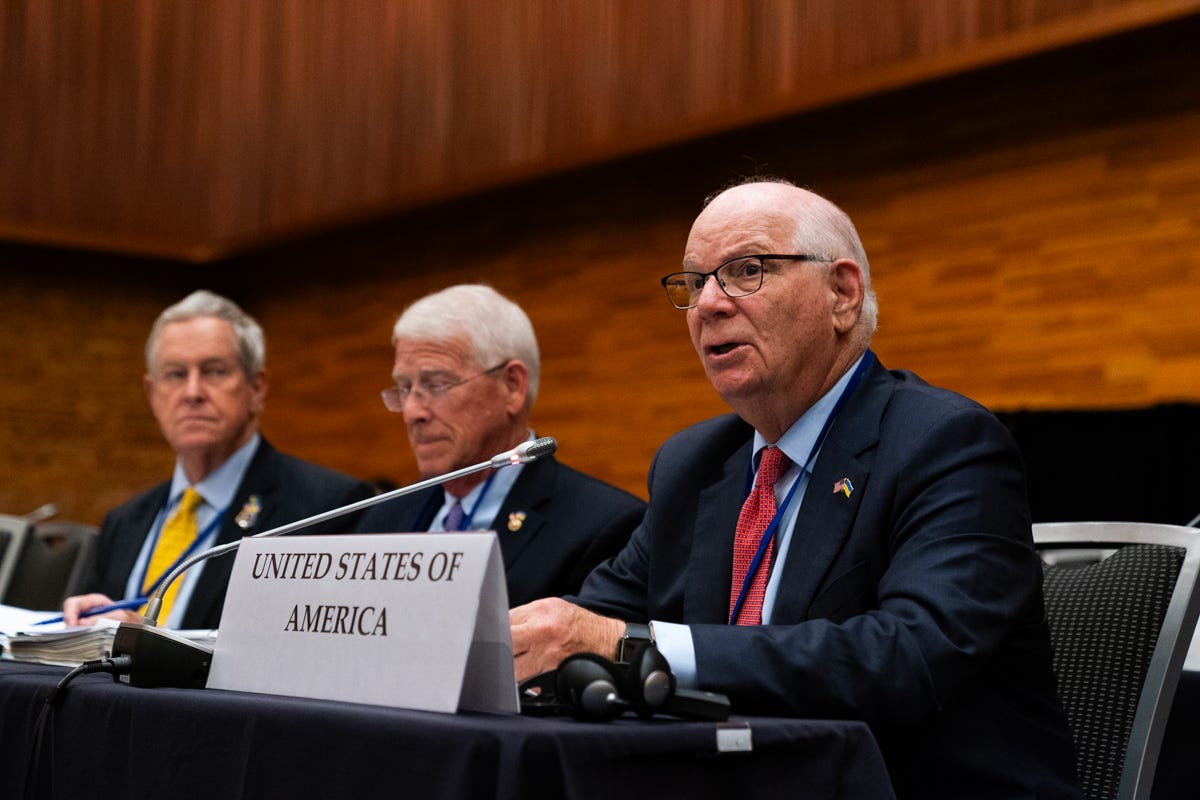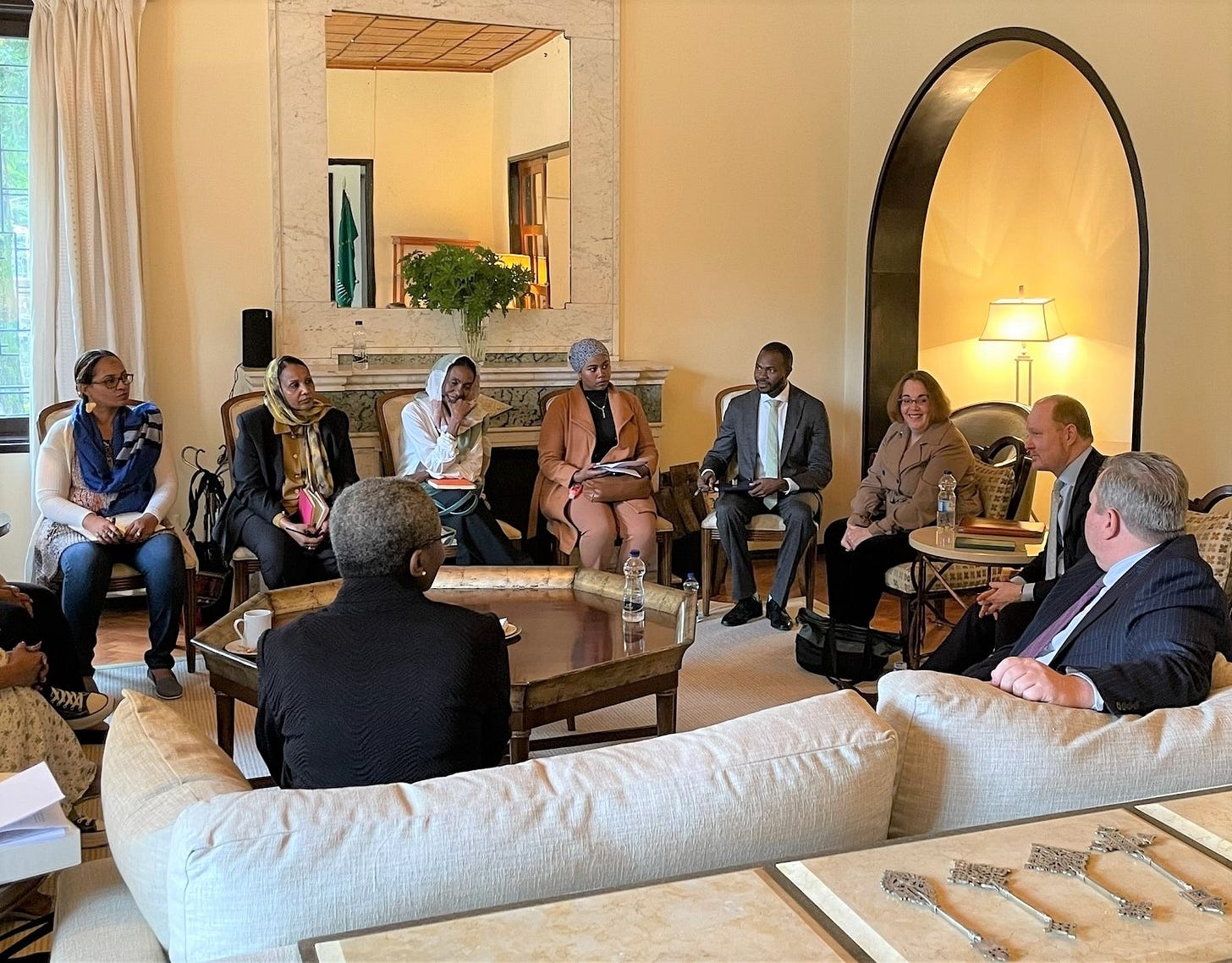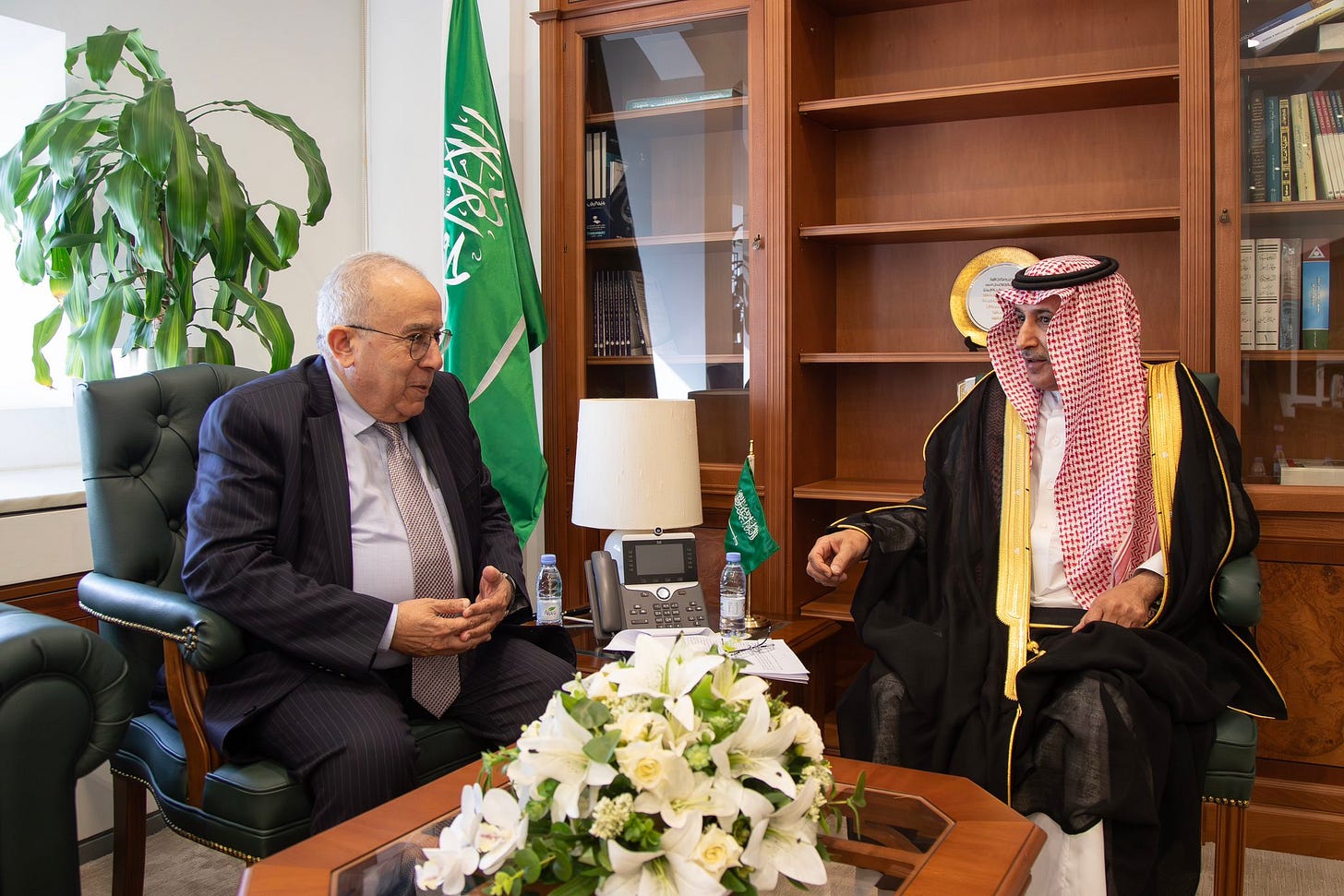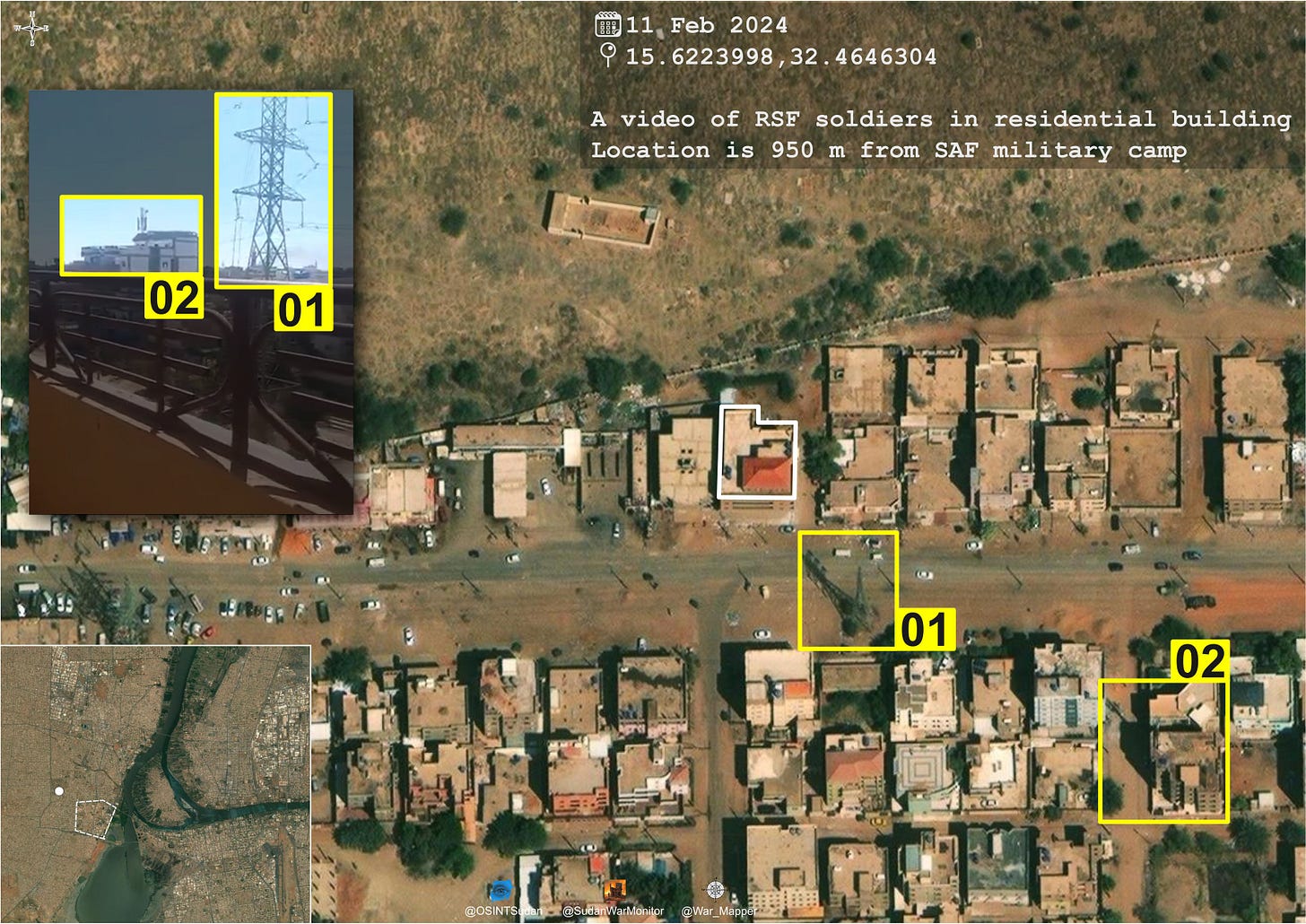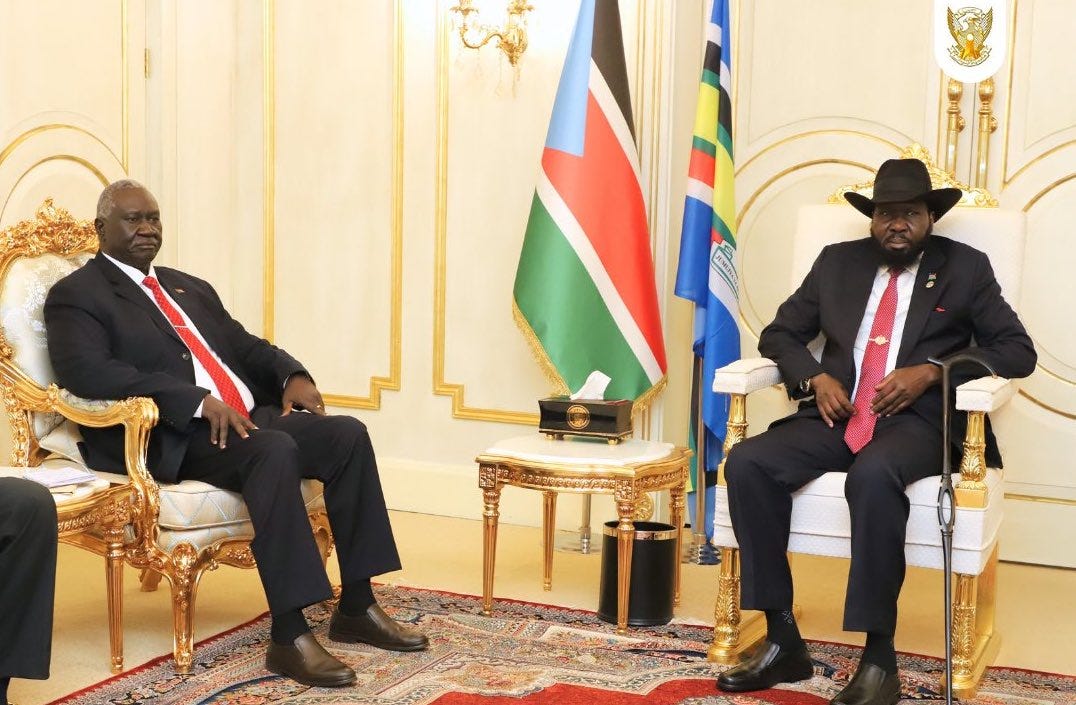U.S. Senators demand Hemedti be punished for 'genocide' in Darfur
Plus: Updates on the latest political and security developments in Sudan
Contents of this article:
Genocide resolution in the U.S. Senate
U.S. meetings with Sudanese stakeholders in Addis Ababa
Updates on the fighting in Omdurman
Sudan’s deputy leader Malik Agar visits South Sudan
New details on the Manama talks
RSF pay off the Revolutionary Awakening Council
Hemedti calls for more violence
Genocide resolution in the U.S. Senate
Leaders in the U.S. Congress are urging the Biden Administration to do more to address the crisis in Sudan, saying that a genocide has taken place, and laying the blame at the feet of the leader of the Rapid Support Forces (RSF), known as Hemedti.
Two Democratic and two Republican senators—Ben Cardin, Jim Risch, Tim Scott, and Cory Booker—jointly introduced a resolution “recognizing the actions of the Rapid Support Forces and allied militia in the Darfur region of Sudan against non-Arab ethnic communities as acts of genocide.”
“The Rapid Support Forces and allied forces, under the leadership of Mohamed Hamdan ‘Hemedti’ Dagalo, have committed heinous atrocities in Darfur,” said Senator Cardin, in a press release announcing the resolution. “Hemedti and those who support his forces must be held accountable.”
Likewise, Senator Risch said, “For the last 10 months, the RSF have carried out unspeakable horrors in Sudan, including the elimination of non-Arab peoples in Darfur... The United States must do all it can to bring an end to the conflict in Sudan and the genocide in Darfur. This includes holding the belligerents accountable and supporting the needs of the Sudanese people...”
Cardin and Risch are the chair and ranking member (vice chair) of the powerful Foreign Relations Committee of the U.S. Senate, the upper chamber of Congress. The resolution’s other two sponsors, Senators Booker and Scott, are the chair and ranking member of the Senate’s Africa subcommittee.
“Hemedti must be held accountable.” — United States Senator Ben Cardin
The 8-page resolution details various reports of atrocities, saying, “there is significant evidence of widespread, systematic actions against the non-Arab ethnic communities of Darfur, including the Masalit people, committed by the RSF and allied militia that meet one or more of the criteria under Article II of the Genocide Convention.”
The resolution comes 20 years after a previous Congressional finding of genocide in Darfur. The troubled Sudanese region hosted UN and African Union peacekeepers from 2004 to 2020. The peacekeeping mission, known as UNAMID, quelled violence but never disarmed the perpetrators of the genocide.
Massacres resumed in some areas of Darfur within about a year of the peacekeepers leaving, intensifying after Hemedti’s RSF went rogue last year and began fighting the military that it had once supported.
The new Senate resolution calls Hemedti “a Janjaweed militia leader,” referring to his role in the previous Darfur genocide as well as the current one. The resolution calls for “tribunals and international criminal investigations to hold the RSF and allied militias accountable for war crimes, crimes against humanity, and genocide.”
It also calls for the U.S. to broker a comprehensive ceasefire in Sudan.
Although Congressional resolutions do not have the force of law (they are only statements of policy), they can influence White House policy and affect public opinion. The 2004 Congressional finding of genocide generated momentum for a more active U.S. foreign policy in Sudan, resulting in more than a decade of U.S. support for peacekeeping in Darfur, mediation efforts, and humanitarian funding.
Moreover, this resolution could draw attention beyond Washington, particularly in Dubai, where the RSF has powerful patrons. The United Arab Emirates is under increasing pressure to halt its support for the RSF.
However, this resolution differs from the 2004 resolution in key respects. The 2004 resolution threatened a “multilateral or even unilateral intervention to stop genocide in Darfur, Sudan, should the United Nations security council fail to act.” By contrast, this resolution does not mention international intervention, though it alludes to the possibility of “establishing safe zones and humanitarian corridors,” without saying who should establish such zones.
To date, there has been little international interest in the idea of reintroducing peacekeepers in Darfur.
U.S. diplomats meet Sudanese stakeholders in Addis
Over the past few days U.S. diplomats held meetings with Sudanese and regional stakeholders on the sidelines of an African Union summit.
Assistance Secretary Molly Phee, Special Envoy for the Horn of Africa Mike Hammer, Ambassador John Godfrey and other U.S. officials met with leaders of Sudan’s anti-war coalition, known as Taqqadum, as well as women leaders and local aid groups.
In a post on social media, the U.S. Bureau of African Affairs stated, “Sudan’s post-conflict future depends on a broad, inclusive, pro-democracy civilian front to identify priorities for a transition and speak with a unified, strong voice on issues Sudanese care about. We applaud Taqqadum’s efforts to continue diversifying to include a wide range of voices, perspectives, peoples, and backgrounds.”
The diplomats also held “a productive meeting” with the UN Secretary-General’s Personal Envoy for Sudan, Ramtane Lamara. They discussed “multilateral efforts to end the conflict, deliver humanitarian assistance to Sudanese in need, and support formation of a pro-democracy civilian front and a transition to civilian governance.”
Since his appointment in November, Lamamra has shuttled between regional capitals and participated in several summits, trying to orchestrate a coordinated international response to the war in Sudan. Most recently, the former Algerian foreign minister was in Riyadh, where he met for two days with top Saudi officials.
Updates on fighting in Omdurman
Fighting continues in Sudan’s largest city, where the Sudan Armed Forces are on the offensive. They are close to breaking the siege of the Corps of Engineers area, having approached Khalifa Square from both the north and south.
Only a few blocks separate their two advancing forces, but the offensive appears to have stalled for now, with few confirmed territorial gains over the past week.
To relieve pressure on this front, the RSF have attacked the Engineers (Mohandiseen) neighborhood from the west. Fire signatures in NASA FIRMs, a near real-time map and database maintained by the U.S. space agency, suggest that the fighting over the past week was concentrated in the western part of Mohandiseen, the Omdurman market, and the southern Omdurman Industrial area, near Hilal Stadium.
Geolocated videos confirm the presence of RSF troops on three sides of Mohandiseen neighborhood. The army still controls most of it, as well as the Banat Garb and Banat Sharq neighborhoods and the military district abutting the river.
The dense Mohandiseen neighborhood consists of two-story and mid-rise buildings with narrow streets, posing challenges to the attacker. This video, geolocated to the northern edge of the neighborhood, demonstrates the exact frontline on November 11. The RSF soldier in the video gives the date (February 11) and says the army has a position only 70 meters away.
A reporter for Sky News, Yousra Elbagir, visited the devastated Omdurman market several days ago. She published this lament for the once vibrant street market, calling it “the beating heart of our mother city.”
“The heart of our city has stopped beating. The veins have emptied and the pulse has flatlined,” Elbagir wrote. “The destruction of Souq Omdurman is a massacre of memory and communal life. A casualty that even peace will struggle to restore.”
Malik Agar in Juba
Malik Agar, the Vice Chair of Sudan’s Transitional Sovereignty Council, carried out a three day-visit to the South Sudanese capital Juba, where he held talks with South Sudan’s President Salva Kiir, as well as European ambassadors.
Kiir and Agar have known each other for decades, since both were commanders in the Sudan People’s Liberation Movement (SPLM), a Sudanese rebel group founded by John Garang, before the SPLM split into northern and southern wings in 2011.
Agar signed an agreement with the Sudanese government in 2020, subsequently joining the Sovereignty Council, the highest authority within the military junta.
In a press release, Agar said he briefed Kiir on military and political developments. “We touched on the Sudanese position of regional initiatives from the AU and IGAD, and I explained to him the reasons for freezing our membership in the IGAD organization.” Sudan suspended its involvement in IGAD after the East African regional bloc hosted the Rapid Support Forces leader at a summit in January.
Kiir and Agar also discussed the Jeddah platform, which is also suspended—a decision taken by the joint Saudi and U.S. mediators in November.
Agar recently also visited Eritrea, where he held talks with President Isaias Afwerki. Eritrea, South Sudan, and Iran are emerging as Sudan’s principal allies. The larger and more powerful Arab states—Egypt and Saudi Arabia—have an ambivalent relationship with the Sudanese military regime, while the United Arab Emirates is hostile.


